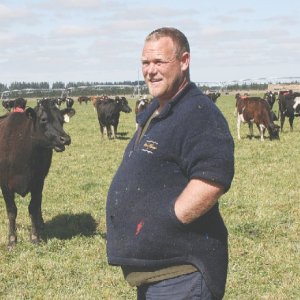“One of my goals is to employ Kiwis and helm them into the industry by creating a place where they can also have a lifestyle that is fun,” he told a recent DairyNZ discussion group meeting on the farm.
This season the 378ha mostly pivot-irrigated farm is budgeted to carry 1370 cows at peak milk, producing 653,500kgMS for the season. The herd’s been increased 10% in anticipation of extra irrigation coming online.
Six staff, one more than last year, mean a per cow full time equivalent of 195, down from 238 cows/FTE last year.
“I’ll guarantee if someone else was to run this farm they’d pull a labour unit out and take an extra $40,000 but I’ve got four kids and I like to watch their sport and go hunting and duck shooting. Last year I had 18 days away and [my 2IC] lifted production while I was gone! You’ve got to give these guys a crack….”
Edwards’ strategy is also to make sure staff aren’t too stretched. They’re rostered to do 229 days/year and 10.5 hour days, up to a total of 2300 hours. It’s the equivalent of working Monday to Friday year-round in town, he points out.
Wherever possible, rosters – 7/2 and 8/3 from late July to Feb, then 6/3 the rest of the year – accommodate off-farm activities, such as Young Farmers, or rugby at the nearby Southern club. “They need to get out there and do something,” stresses Edwards.
During calving, crockpots of stew, coffee, noodles and other rations are provided at the shed. “We don’t do sick days and we eat lots.”
The whole team, bar Edwards, is under 21. Current average stay is 2.2 years but Edwards says he’d like to see this up to at least three years. It would be higher but for two staff who’d been with him for six years, both Filipinos, leaving last year.
Three junior staff live in a three bedroom house on the farm, while others have individual accommodation.
Edwards says he doesn’t pay “top line” rates, and knows his employees have been approached by other farmers. “All these guys get job offers, and one day the time will come when they go… but I just ask them why they are going. I spend a massive amount of time on my people here, and if you want to do it, it’s very rewarding.”
A previous career in the fishing industry has clearly influenced his approach. “If you don’t look after people in that industry you end up with an ugly nose and teeth.”
He believes the staffing issues many farms face come down to being short of hands in the first place.
Providing a meal, and making sure everybody has time to eat it, can quickly pay for itself, he adds. “It’s time for everybody to stop, and think, and maybe tell you about that down cow that’s just calved. Save a cow and the meals have paid for themselves already.”
















